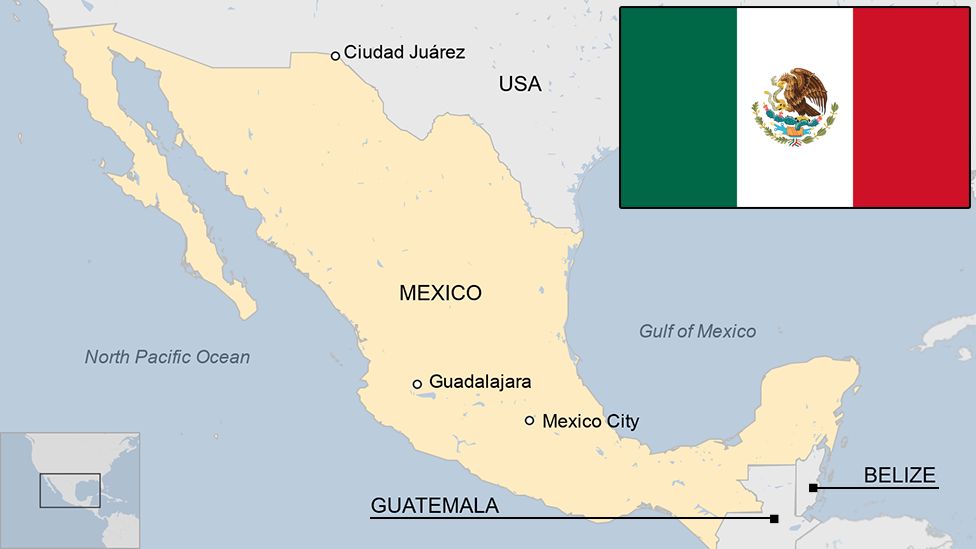Mexico country profile
- Published

Mexico is a nation where affluence, natural splendour, a rich indigenous history, poverty and urban blight rub shoulders. It is a major oil exporter, but rural areas and shanty towns suffer neglect.
Pre-Columbian Mexico was one of world's cradles of civilization, and home to civilizations including the Olmec, Maya, Zapotec, Teotihuacan, Purepecha and Aztecs.
In past decades, Mexico has been contending with high crime rates, official corruption, narcotrafficking and a stagnant economy.
Hundreds of thousands of people have been killed in the continuing organised crime killings and drugs-related gang violence since 2006, which saw the army being deployed to crackdown on drugs cartels.
- Read more country profiles - Profiles by BBC Monitoring
UNITED MEXICAN STATES: FACTS
- Capital: Mexico City
- Area: 1,972,550 sq km
- Population: 129.1 million
- Languages: Spanish, also Nahuatl, Yucatec Maya, Zapotec, Mixtec, Mayo, Yaqui, Tzeltal, Tzotzil, Chol, Totonac and others
- Life expectancy: 73 years (men) 78 years (women)
LEADERS
President Andres Manuel López Obrador
Left-wing candidate Andres Manuel López Obrador won an overwhelming victory in the 2018 presidential election.
His priorities are to tackle corruption and reverse decades of free-market economic policy - which he blames for social inequality, endemic violence, and the desire of so many young people to leave the country is search of a better life.
Mr López Obrador, popularly known by his initials Amlo, is a former mayor of Mexico City, and stood for the presidency on two earlier occasions.
MEDIA
Reporters Without Borders describes Mexico as "one of the hemisphere's most dangerous countries" for the media.
Drug cartels and corrupt officials are implicated in most of the crimes of violence against journalists, which almost always go unpunished.
Two big players, Televisa and TV Azteca, dominate the TV sector.
Mexico is one of Latin America's biggest internet markets.
TIMELINE
Some key dates in Mexico's history:
1500BC - Beginning of Olmec culture - the first major Mesoamerican civilization.
600BC - Olmecs replaced by regional cultures such as Maya, Zapotec, Totonac, and Teotihuacán civilizations.
250-AD - Mayan civilization, based around Yucatan, grows to become one of the most dominant groups. Classical Mayan civilization reaches its peak c. 600AD in alliance with the Teotihuacán.
600-1000 - Toltecs migrate from north of Teotihuacán and establish their empire in the central valley of Mexico by 10th Century. Spread of militarism in Mesoamerican societies.
1200 - Toltecs defeated by Chichimecha alliance.
14th Century - The Chichimecha - or Aztecs - settle in Mexico's central valley, and found Tenochtitlán near Lake Texcoco.
1420s - Aztecs emerge as the dominant force in central Mexico.
1517 - Francisco Hernández de Córdoba, is the first European to visit Mexican territory. Arriving with about 100 men he withdraws after clashes with locals.
1519 - Spanish army under Hernán Cortés lands at Veracruz, marking the start of Spain's conquest of Mexico.
1521 - Cortés and his local allies finally defeat Aztec forces and capture Tenochtitlán. Cortés razes the city and builds Mexico City on its ruins.
1521-1820 - Mexico forms part of the Viceroyalty of New Spain.
1810-21 - War of Independence ends with the creation of the short-lived Mexican Empire, which includes Central America to the southern border of modern-day Costa Rica, as well as what is now the south-western US.
1824 - Mexico becomes a federal republic. Central American provinces secede.
1833 - General Antonio López de Santa Anna becomes president after leading resistance to a Spanish attempt to recapture Mexico in 1829.
1836 - Texas, then part of Mexico, declares independence. After attempting to quell the rebellion in Texas, Santa Anna's forces are defeated by rebel leader Sam Houston at San Jacinto.
1846-8 - Mexican-American War ends with Mexico being forced to sell its northern provinces (including modern-day California, Nevada, New Mexico, Arizona and Utah) to the US.
1861-67 - Mexico suspends payment on its foreign debts. France, Britain and Spain intervene to protect their investments. British and Spanish soon withdraw, but Napoleon III sends French troops to occupy Mexico City, and installs Austrian archduke Maximilian as emperor.
1865 - With the end of the US civil war, Washington increases support for the deposed Mexican government.
1867 - France withdraws its troops under US pressure. Maximilian elects to remain in Mexico, and is executed after being captured by Mexican forces.
1910-1920 - Mexican Revolution. The decade-long conflict sees te eventual establishment of modern Mexico's constitutional republic. Some 900,000 people are killed in the war - out of the 1910 population of 15 million - and a further 900,000 migrate to the US to escape the violence and seek work.
1929 - Formation of the National Revolutionary Party, which later becomes the Institutional Revolutionary Party, or PRI, which dominates politics until 2000.
1941 - Mexico declares war on the Axis powers after Japan bombs Pearl Harbor, with Mexican pilots fighting against the Japanese in the Philippines, alongside US forces.
1968 - Student demonstration in Mexico City during the Olympic Games is fired on by security forces. Hundreds of protesters are killed or wounded.
1976 - Huge offshore oil reserves discovered.
1994 - Zapatista rebels demand improved rights for indigenous people in the Chiapas region.
2000 - Vicente Fox breaks ruling PRI party's seven-decade dominance by winning the presidential election.
2006 - President Felipe Calderon launches crackdown on drug gangs, with violence escalating into a national security crisis.
2018 - Left-wing former mayor of Mexico City, Andres Manuel López Obrador, wins an overwhelming victory in presidential elections.
Related Topics
- Published20 June 2023
- Published29 August 2023
- Published10 April 2023
- Published15 January
- Published31 March 2023
- Published13 February